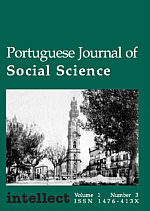ISSN 1476-413X

Science, culture, and policy in Portugal: a triangle of changing relationships? (pp.157-173)
Maria Eduarda Gonçalves and Paula Castro
The sociology of law as a sub-discipline of sociology (pp.175-184)
Pierre Guibentiff
Gender and science in Portugal (pp.185-198)
Lígia Amâncio
Review article:
Filipe Ribeiro de Meneses (National University of Ireland).
Ana Mira (ed.) (2002), Actas das sessões secretas da Câmara dos
Deputados e do Senado da República sobre a participação de Portugal na I
Grande Guerra, Lisbon: Assembleia da República and Edições
Afrontamento.
Book reviews:
Manuela Cook.
Eulália Maria Lahmeyer Lobo (2001), Imigração portuguesa no Brasil,
São Paulo: Hucitec, 367pp, ISBN 85-271-1566-7.
Tiago Fernandes
(European University Institute).
Nancy Bermeo and Philip Nord (eds.) (2000), Civil society before
democracy: lessons from nineteenth century Europe, New York and
Oxford: Rowman and Littlefield.
José Magone (University
of Hull).
Luís Nuno Rodrigues, Salazar-Kemmedy: crise de uma aliança. As
relações luso-americanas entre 1961 e 1963, Lisbon: Notícias, 343pp,
ISBN 972-46-1352-6.
Science, culture, and policy in Portugal: a triangle of changing relationships?
[Abstract]
The main objective of this paper is to analyse scientific culture as a new policy issue in Portugal, against the background of recent trends in the area of studies called 'Pulic Understanding of Science' (PUS). We begin by drawing a brief historical overview of the PUS area, and of the Portuguese case in particular. We proceed to examine the relationships that the public at large, the political institutions, and the mass media have maintained with science during the last decades in Portugal. These relationships show a trend from isolation to integration. We conclude that the current situation in Portugal is one of coexistence of contradictory and sometimes paradoxical discourses and practices in what concerns the public of understanding science, science-policy relations, and science-public interactions.
The sociology of law as a sub-discipline of sociology
[Abstract]
The division of sociology into different sub-disciplines plays an important role in the discipline's development, and the establishment of a particular sub-discipline has strategic and cognitive implications for those engaged in the research of the particular topic in question, as well as for sociology in general. This is why the choice of actively contributing such a field deserves to be fully discussed. The present paper tackles the case of sociology of law, a sub-discipline whose position between jurisprudence and social science has always been rather uncomfortable, but whose relevance is hardly questionable at a time of rapid change in the contents, modes of discrimination, and the implementation of social norms.
Gender and science in Portugal
[Abstract]
The situation of women in science in Portugal stands out as a particular case in international comparisons. The argument of this article is that this case is not so particular after all. To pursue this argument, gender and science is approached in two ways. In the first part, historical and social factors that may have contributed to the significant presence of women in science will be discussed. The second part focuses on scientific careers and institutions, especially universities, and aims at unveiling gender processes that have been evidenced by research on gender and science in other countries. Throughout the article, evidence will be presented that shows that despite some specificities pertaining to the rapid process of modernisation experienced by Portugal during the last 30 years, science has been institutionalised as a gendered profession. Part of this research was funded by the research grant POCTI/SOC/38032/2001 of the Fundação para a Ciência e a Tecnologia.